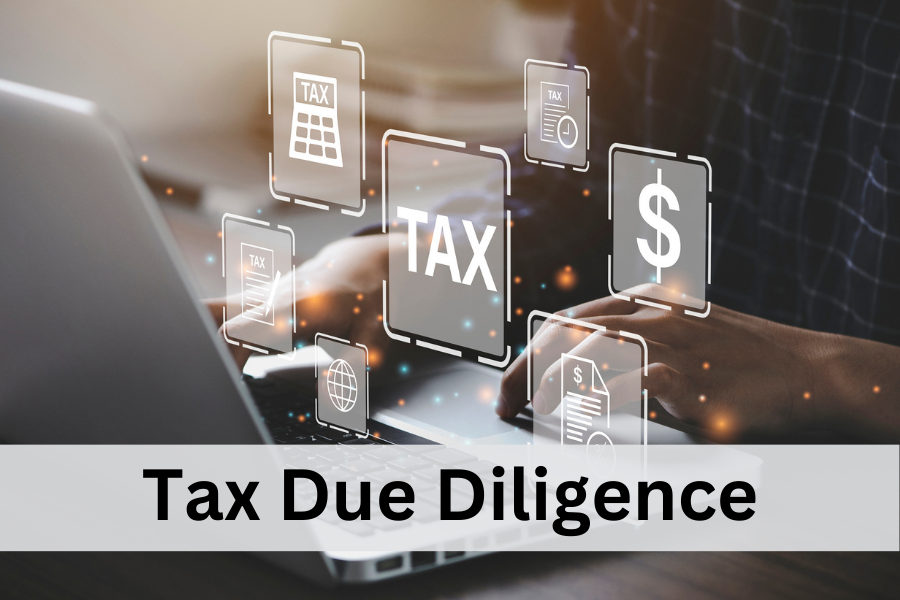Introduction: What is Tax Due Diligence?
When it comes to managing taxes, whether for an individual or a business, tax due diligence is a critical process. It involves thoroughly reviewing the financial and tax records of a business or individual to ensure that all tax obligations are met and there are no hidden tax liabilities. Whether you’re planning a merger, acquisition, or even just trying to improve your tax strategy, tax due diligence plays an important role in minimizing risks and maximizing your financial outcomes.
This blog post will explore the significance of tax due diligence, how to conduct it effectively, and how Syed Professional Services can assist you in making informed tax decisions. We’ll also look at how it impacts various aspects of business transactions, such as mergers, acquisitions, and investment opportunities, as well as its importance in tax planning.

Why is Tax Due Diligence Crucial?
Tax due diligence provides a comprehensive assessment of a business’s or individual’s tax compliance and financial position. It helps identify any potential tax risks or liabilities that may exist, allowing you to make better-informed decisions. For businesses, tax due diligence is especially important during mergers, acquisitions, or any significant financial transaction because it uncovers issues that could affect the deal’s value.
In the context of business transactions, tax due diligence is a proactive approach that ensures you are not blindsided by unexpected tax liabilities. For example, when acquiring a company, conducting tax due diligence can uncover unpaid taxes, non-compliance with tax laws, or unreported income, which could significantly impact the price and terms of the deal.
For individuals, conducting proper tax due diligence is equally vital, particularly in cases of large financial decisions or investments, ensuring that your tax records are in order and there are no hidden liabilities that could come to light later.
Key Components of Tax Due Diligence
-
Review of Tax Filings and Returns
One of the primary components of tax due diligence is reviewing past tax filings and returns. This includes examining business or personal tax returns to ensure they are accurate, complete, and consistent with the financial statements. -
Analysis of Tax Compliance
Ensuring compliance with local, state, and federal tax laws is a core part of tax due diligence. This process includes checking whether taxes have been paid on time and whether all deductions and credits have been accurately claimed. -
Identification of Potential Liabilities
Tax due diligence helps uncover potential liabilities such as unpaid taxes, penalties, or audit risks. By identifying these issues early, you can take steps to address them before they escalate into costly problems. -
Assessment of Tax Benefits and Credits
In addition to identifying liabilities, tax due diligence also helps identify tax benefits or credits that could be claimed. This could include tax credits for research and development, energy efficiency improvements, or various other deductions available to individuals and businesses. -
Review of Contracts and Agreements
Contracts, leases, and other agreements should also be reviewed during tax due diligence. This includes examining agreements to understand tax implications, such as whether there are any tax obligations tied to specific contracts or long-term liabilities. -
Analysis of Historical Tax Positions
A deep dive into the historical tax positions of a company or individual helps identify any aggressive tax strategies that may come under scrutiny from tax authorities. This process also helps uncover any potential risks associated with previous tax filings.
How Tax Due Diligence Impacts Business Transactions
In business transactions, tax due diligence plays an especially critical role. Whether you’re buying, selling, or merging with another company, understanding the tax situation of the business you’re dealing with is crucial. Here are a few examples of how tax due diligence can impact business transactions:
-
Mergers and Acquisitions
When acquiring a business, understanding its tax situation is essential. If the business has unresolved tax issues, unpaid liabilities, or a history of non-compliance, these could significantly affect the transaction value. A thorough tax due diligence process helps buyers and sellers negotiate better terms and avoid future tax-related headaches. -
Valuation of a Business
During business valuation, tax due diligence helps assess the true value of a company. Hidden tax liabilities can drastically reduce the value of a business. Conducting proper due diligence helps you ensure that the business you’re acquiring has no hidden tax risks that could affect its future profitability. -
Strategic Tax Planning
Proper tax due diligence also facilitates strategic tax planning for businesses. By understanding the tax landscape, companies can plan for long-term tax savings, optimize their structure, and reduce the risk of costly tax surprises in the future.
Tax Due Diligence for Mergers and Acquisitions: A Deeper Dive
Mergers and acquisitions (M&A) are some of the most complex and high-stakes transactions, and tax due diligence is a critical component of the process. Here’s how tax due diligence plays an essential role in M&A:
-
Uncovering Tax Liabilities
When merging with or acquiring another company, you inherit its tax position. If the target company has unresolved tax liabilities or ongoing audits, these liabilities may transfer to the acquiring company. Tax due diligence helps identify such risks and provides clarity on any potential exposures. -
Assessing the Effectiveness of the Deal Structure
The structure of a deal (asset sale vs. stock sale) can have significant tax implications. Proper tax due diligence helps determine which structure will result in the least tax burden and optimize the overall deal for both parties. -
Review of Tax Attributes
Certain tax attributes, such as carryforward tax credits, losses, and other benefits, can be transferred during an acquisition. Tax due diligence helps determine if any of these attributes can be leveraged by the buyer to reduce future tax liabilities. -
Cross-Border Tax Considerations
In international M&A deals, cross-border tax-due diligence is essential. Each country has its tax laws, and understanding these rules is crucial to prevent double taxation, uncover withholding tax obligations, and navigate any international tax treaties.
Tax Due Diligence in Estate Planning and Investments
Tax-due diligence isn’t limited to business transactions. For individuals, it’s equally important when it comes to estate planning or significant investments. Here’s why:
-
Estate Planning
When planning your estate, conducting tax-due diligence ensures that your financial records are in order. This includes reviewing past tax returns, identifying potential future tax liabilities, and ensuring that all deductions are appropriately claimed. -
Investment Opportunities
Before making large investments, it’s essential to conduct tax-due diligence. This includes assessing the tax implications of the investment, understanding any associated tax risks, and ensuring the investment aligns with your overall tax strategy.
Best Practices for Conducting Tax Due Diligence
To ensure thorough and effective tax-due diligence, it’s essential to follow best practices:
-
Engage Professionals
Working with tax professionals is crucial. Experts can help navigate the complexities of tax laws and ensure that all potential risks and liabilities are accounted for. -
Gather All Relevant Documents
Ensure you have access to all necessary documents, including tax returns, financial statements, and contractual agreements. These are essential for a thorough review. -
Use Technology
Modern technology and software can help streamline the due diligence process by automatically flagging discrepancies, potential issues, and areas that require further review. -
Document Everything
Maintain comprehensive records of all findings during the tax-due diligence process. This documentation is essential for legal protection and future reference.
Conclusion: Partner with Syed Professional Services for Tax Due Diligence
Tax-due diligence is a vital process for both businesses and individuals. It ensures that you are fully aware of your financial position, prevents unexpected tax liabilities, and helps in strategic tax planning. Whether you are involved in a business transaction, planning your estate, or looking to optimize your tax strategy, Syed Professional Services can provide the expertise and support you need.
With years of experience in tax, accounting, and immigration services, Syed Professional Services is committed to ensuring that your tax situation is optimized for success. Contact us today to learn more about how we can assist you with tax-due diligence and guide you toward financial security.




